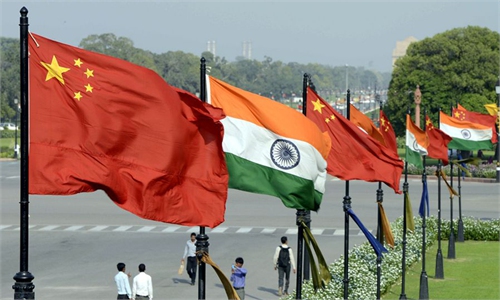COMMENTS / EXPERT ASSESSMENT
Chinese capital to be coveted by Indian firms after pandemic

Illustration: Xia Qing/GT
After more than half a year of reckless provocation against China, India reportedly plans to lift a blockage on Chinese investments amid its rising awareness of the importance of Chinese capital which has boosted the development of Indian industries in the past years.It seems that New Delhi has realized the growing importance of attracting foreign investment to its own growth.
The Indian government has begun clearing foreign direct investment (FDI) proposals from China on a case-by-case basis, ending the freeze on such clearances that lasted nine months, The Times of India reported on Monday, citing anonymous government sources.
Besides its ill-intended provocations along the border, New Delhi revised its FDI rules last year to heighten scrutiny on investment from certain countries bordering India, which has been widely regarded as a move discriminating Chinese investments. In addition to its sweeping ban on Chinese apps, New Delhi has severely damaged the interest of Chinese investors, as well as its own industries.
As the once-in-a-century global health crisis continued to batter the world, India became one of the hardest-hit countries, with its already weakened economic growth slumping into deep recession. It was estimated to record an 8 percent economic contraction during its fiscal year of 2020-21.
Meanwhile, the worsening epidemic situation and a complex path towards recovery have made its internal contradictions more visible. Massive farmer protests have taken place since last August, impeding economic rebooting of the country.
Besieged by multiple challenges, the Indian government seemingly has woken up from its "decoupling China" fantasy.
There has been not much benefit for India to collect. To the contrary, the US and other developed countries are struggling in the quagmire of the coronavirus pandemic and brutal economic recession, making it hard for them to attract investment from other countries during the post-pandemic era.
In fact, there's no alternative of Chinese investment which has advantages in capital, technology and management, not to mention its great fitness in the Indian market. Chinese investors have been long facilitating the development of Indian industries.
With huge market potential of both sides and strong economic complementarities, China and India are fully capable of achieving win-win results through close cooperation. China has been India's largest trading partner for many years in a row, and its cumulative investment in India has exceeded $8 billion now.
Among India's 30 unicorns, over 18 have received massive investment from Chinese firms, according to a report by the Sunday Guardian Live in June 2020.
The growing economic and trade exchange between China and India has helped local businesses, creating precious jobs for local residents and bringing better products and services to consumers.
New Delhi's sudden policy change to crack down on Chinese investment in the last two years, however, has severely hindered a mutually beneficial exchange. Though there's a possible reversed attitude of New Delhi, it is suggested that Chinese investors will take a more prudent stance toward heading to the largest South Asian country and investing there.
India, on the other hand, needs to make concrete moves to improve its business environment, including a stable and transparent policy framework, sound legal protection as well as a friendlier public environment.
The author is director of Institute of Bay of Bengal Studies with Shenzhen University. bizopinion@globaltimes.com.cn


